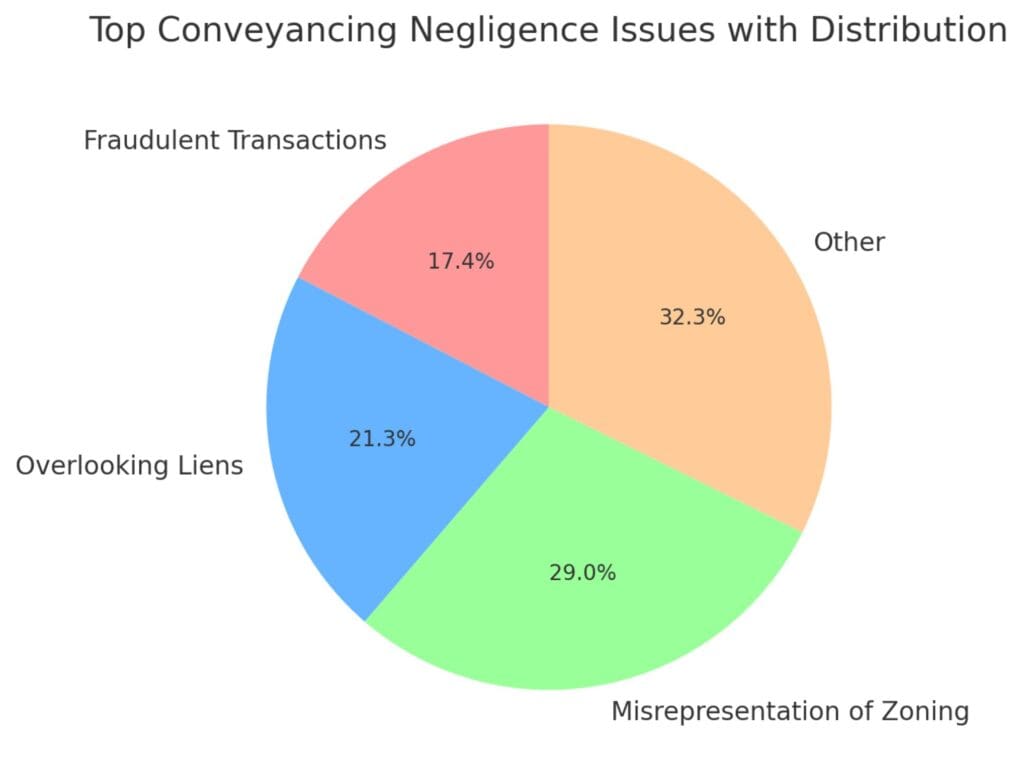Tackling Conveyancing Negligence: A Complete Guide for Property Buyers
Summary: Negligence in the conveyancing process can badly impact property transactions, causing financial and emotional stress for the parties involved. Today, you will learn what conveyancing negligence entails, the responsibilities of lawyers, and how affected parties can make a claim. Buyers, sellers, and legal professionals should be aware of these issues to ensure that property transactions are conducted with the highest degree of care and expertise.
1. What is Conveyancing Negligence?
Conveyancing negligence occurs when a conveyancer fails to perform their duties to the required standard, resulting in harm or financial loss to their client. Errors or oversights during the property transaction process can lead to serious legal and financial repercussions. It can happen to anyone with just a bit of carelessness, so take your time and conduct thorough, transparent business with your lawyer.
2. Roles and Responsibilities of a Conveyancer
A conveyancer’s primary role is to facilitate the smooth transfer of property ownership. Good conveyancers provide 20 services. Here are 5 most important conveyancing roles and responsibilities:
- Conducting Searches: Performing various property searches to identify legal restrictions or issues.
- Managing Contracts: Drafting, reviewing, and exchanging sale contracts to ensure accuracy and fairness.
- Handling Funds: Managing financial aspects, including deposit handling and funds transfer at completion.
- Liaising with Parties: Communicating between buyers, sellers, mortgage lenders, and other relevant parties.

Property lawyers owe a duty of care to their clients to act with reason and skill. Failure to perform their duties can be grounds for a professional negligence claim. Conveyancers often practice as lawyers, making them subject to the regulations and standards of the law society.
3. Common Examples of Conveyancing Negligence
Negligence in conveyancing can manifest in various forms:
- failing to identify legal restrictions on the property
- incorrect handling of contractual details
- overlooking crucial local authority searches.
New owners could face unexpected liabilities with the property loosing value. If you want to learn more, please read our post: Common scenarios and examples of conveyancing negligence.
During our 10 years in conveyancing and property transaction law, we’ve seen very serious consequences people had due to poor conveyancing. Some of these were
- significant financial losses from undisclosed liens or encumbrances,
- legal disputes over property boundaries that took years to resolve,
- missed investment opportunities due to delayed or incorrect property registrations.
In the worst cases, buyers have faced total losses of property due to unrecognized fraudulent schemes.
4. How to Recognize Professional Conveyancing Negligence
Recognizing professional negligence involves understanding the standard practices in conveyancing and identifying deviations that lead to loss. Common indicators include delayed transactions without reasonable cause, failure to inform about any property issues, and incorrect legal advice.
The six most common examples you may face are:
- Missed Deadlines: Delays that affect property rights or financial penalties.
- Incomplete Searches: Failing to perform necessary legal searches on the property.
- Documentation Errors: Mistakes in contracts or legal documents.
- Poor Advice on Property Issues: Inaccurate advice on boundaries, building approvals, or zoning.
- Failure to Register Documents: Not filing necessary documents with relevant authorities.
- Neglecting to Clear Titles: Failing to ensure the property title is free from encumbrances or liens.
Try always to be aware of the circumstances of the case and seek to understand the conveyancing law that applies.
5. Legal Framework for Negligence Claims
To make a successful claim for conveyancing negligence, one must prove that:
- the conveyancer owed a duty of care,
- the duty was breached,
- the breach caused significant harm or financial loss.
With this legal framework, clients have a means to seek compensation when professional standards are not met.
6. Steps to Take if You Suspect Negligence

If you suspect negligence, you should gather all related documentation, such as the conveyancing file, and seek expert legal advice immediately. Professional negligence lawyers can help assess the strength of your case and guide you through the process of filing a claim. They will instruct you on how to proceed and may offer services on a ‘no win, no fee’ basis. If your property purchase case is in progress, first seek an experienced conveyancing lawyer. This time, check better: look for reviews, recommendations, and all other info that will tell you more about the conveyance that you plan to hire.
7. Choosing the Right Legal Support
Selecting the right conveyancing lawyer is priority no. 1. Look for attorneys who specialize in property law and have experience handling negligence claims. They should be registered with the Lawyers Regulation Authority and ideally work on a fixed fee basis to avoid unexpected costs.
Check out our detailed guide about how to find a good conveyancer.
If you are purchasing your first home, be very careful in selecting the proper team to guide you. Avoid the 5 most common mistakes many first-home buyers make. Even the transactions that seem simple and straightforward might be a hidden minefield in reality!
8. Preventive Measures to Avoid Negligence
To prevent negligence, keep clear and continuous communication with your conveyancing lawyer.
- Regular updates and detailed discussions about the process will identify potential issues early on.
- Additionally, hiring a conveyancer who holds professional indemnity insurance provides an added layer of protection.
- Most importantly, do not choose legal advisors based on the price or unconfirmed fancy stories. Thousands of dollars are on the table, and probably your entire financial future might be jeopardized if you do not research properly or if you choose solely by price criteria.
Saving a couple of hundreds of dollars might cost you tens of thousands later (and many sleepless nights).
Summary and Key Takeaways
Awareness of the risks and knowing how to react when things go wrong can protect your investments and ensure smoother transactions.
Key Takeaways:
- Vigilance in understanding and overseeing the conveyancing process is essential.
- Recognizing the signs of negligence and understanding the legal framework for claims can protect your interests.
- Choosing the right conveyancer and taking immediate action if issues arise are fundamental steps in safeguarding your property transactions.
Frequently Asked Questions
1. What are the three most severe examples of conveyancing negligence in a legal context?

In a legal context, negligence refers to a failure to exercise the care that a reasonable person would exercise in similar circumstances, resulting in harm or damage to another party. In conveyancing, the three situations listed below are among the most damaging for property buyers:
- Failure to detect fraudulent transactions: Conveyancer fails to identify signs of fraud, leading to financial losses for the buyer.
- Overlooking a lien or encumbrance: Conveyancer misses existing liens, causing legal and financial issues for the new owner.
- Misrepresentation of zoning laws: Conveyancer incorrectly advises on zoning regulations, affecting the property’s intended use.
2. When should I consult a law firm regarding a negligence case?
You should seek advice from a law firm specializing in negligence cases if you believe you have been a victim of negligent behavior that has caused you harm or financial loss. Before contacting the law firm, we recommend consulting with a good, experienced conveyancing lawyer. They will maybe manage to save your case and minimize financial consequences. Also, they will recommend the best course of action. The most important step is to find really experienced and highly praised conveyance with an accent on experience.
Why?
Because experienced conveyancing lawyers know every loophole, and they’ve already handled cases such as yours. With experienced conveyancing lawyers, your chances multiply and might turn the bleak situation into a success.
3. What are some examples of conveyancing negligence claims?
Situations such as defective products, claims against conveyancers, failing to advise on essential matters, or building regulations violations could potentially give rise to a negligence claim. Here are the five most frequent claims:
- Failure to advise on planning permission: The conveyancer did not inform the buyer about the need for planning permission for intended alterations.
- Incorrect property boundaries: The conveyancer provided inaccurate information about property boundaries, leading to disputes.
- Missed charges or restrictions: The conveyancer failed to identify charges or restrictions on the property that affect its use.
- Faulty lease review: Errors in reviewing the lease terms that negatively impact the buyer.
- Inadequate search: The conveyancer did not perform comprehensive searches, missing significant issues like flooding risk.
4. How do I know if I have a valid professional negligence action?
If you believe a specialist professional, like a conveyancer, fell below the standard of care expected in their profession and you suffered harm as a result, you may have grounds for a professional negligence action. If you are unsure of what to do, contact us, and we’ll help you as we did dozens of times during our 10+ years.
5. What steps should I take if I suspect negligence in a property transaction?
If you suspect negligence in a property transaction, you should enquiry with negligence or conveyancing lawyers to assess the situation and instruct them to investigate further. Here are the five steps you should take, following the order we provided:
- Review the transaction documents: Check all related documents for any errors or omissions.
- Consult a property or conveyancing lawyer: Seek advice from a lawyer who specializes in conveyancing law.
- Gather evidence: Compile all communications and documents related to the transaction.
- File a complaint: Contact the conveyancer’s regulatory body to report the issue.
- Consider legal action: Discuss with your conveyancing lawyer the possibility of pursuing a claim for compensation.
6. Can I claim compensation on a no-win, no-fee basis for a conveyancing negligence case?
Yes, many law firms offer conditional fee arrangements where you only pay legal fees if the case is successful, making it easier for you to claim compensation without upfront costs.
7. What is the importance of proving causation in a negligence case?
Conveyancing negligence can profoundly impact property transactions, causing financial and emotional stress for the parties involved. This detailed guide delves into what conveyancing negligence entails, the responsibilities of lawyers, and how affected parties can make a claim.
Get your quote today.
Relax knowing our experts are handling your property conveyancing.









